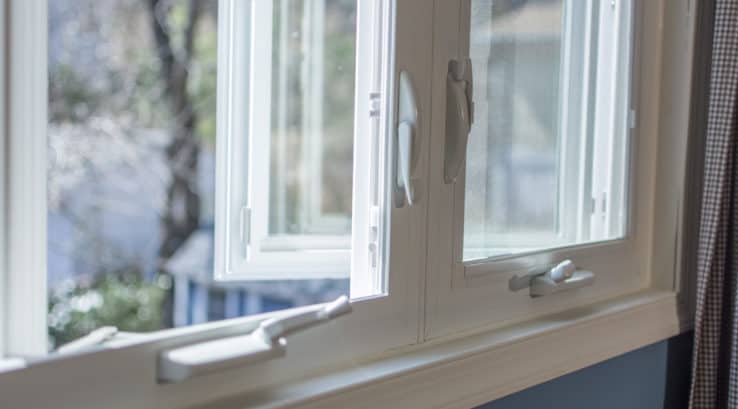Windows come in many shapes, sizes, and functions, giving both residential and commercial property owners many choices to consider. For those who want to invest in a simple, functional style, casement windows can be a perfect option. Ideal for facilitating airflow and letting in light without a cluttered or chaotic appearance, casement windows can be a great fit for all kinds of properties.
A casement window is a form of window with a hinge on the side. Unlike traditional single or double-hung windows that slide upward, casement windows swing outward, allowing a great amount of ventilation — or a little bit, if that’s preferred. Casement windows are generally made from one large pane of glass rather than multiple smaller panes joined together as is sometimes seen with other window types.
How Do Casement Windows Work?
Casement windows work by opening outwards to let light and air into a building. They can be used with or without a screen, depending on location and preference, and are easy to adjust as temperature needs fluctuate. Most have a crank that is used to open and close the window, rather than requiring more manual adjustments.
What Are the Benefits of Casement Windows?
Casement windows offer many benefits to property owners seeking to replace or upgrade their windows.
- Attractive, modern style: Casement windows are sleek and sophisticated in appearance, providing a more modern look than some other alternatives.
- Varying sizes: Casement windows are available in many sizes, from short and narrow to large and wide. Regardless of the space you want to fill, casement windows will likely be able to accommodate all of your needs or preferences.
- Easy to use: Unlike some windows that can be challenging to open and close, casement windows are user-friendly and allow for quick adjustments based on weather and airflow needs.
- Increased airflow: Some windows, like single or double-hung windows, can only be opened halfway due to the mechanics of sliding a window up or down. Casement windows can be opened fully, allowing for more airflow.
- Energy-efficient: Casement windows are among the most energy-efficient windows on the market. Frames for casement windows are frequently produced from materials like vinyl, aluminum, fiberglass, and wood, all of which can create an effective seal. With one single pane of glass, casement windows minimize the possibility of drafts or unwanted airflow.
- Potential exit: No one wants to think about needing to escape in an emergency, but in the case of fire, for example, getting out of a building quickly is extremely important. Casement windows can be fully opened, making it more likely a human will be able to fit through the window should the circumstances call for it.
When Should You Use Casement Windows?
In theory, property owners can install casement windows wherever they find appropriate, but there are some situations in which casement windows are ideal. You may prefer a casement window when:
- The climate is variable
- Energy efficiency is a concern
- There are limited egress options throughout the rest of a property
- There is no need for a window air conditioner
- Windows must suit a clean, modern aesthetic
- Fresh air is a priority
Despite the advantages, casement windows aren’t always appropriate, so be sure to consider all potential pros and cons before moving forward.
Choosing Casement Windows
Choosing the right casement windows isn’t always easy, especially with all of the shapes, sizes, and styles to consider. If you are searching for the right casement windows for your residential or commercial property, a professional can help you make the best possible choice. With expert knowledge about sizing, materials, and functionality, a pro can ensure you make the right decision for your property as well as for your budget.
If you are shopping for casement windows, the pros at Thompson Creek Windows can help you make the best possible choice. Contact us today for a free quote and see how we can make a difference.


